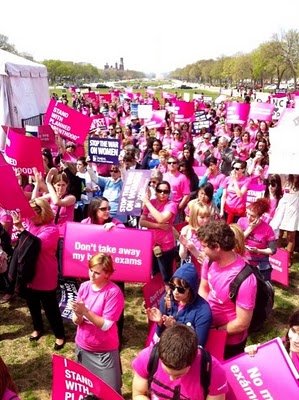Warning: this post contains both political commentary, which you know is a bit of an irregularity for this site, along with clinical info. If you aren’t interested in my politics, feel free to skip this post altogether. Any opinions expressed here are purely mine–they do not represent the views of any of the organizations with whom I work.
(photo courtesy of Planned Parenthood)
Maybe this is a topic whose time has come simply because of what’s happening with the US government and the impending shutdown. Bleary eyed and barely awake, I’m reading that the sticking point between the two parties appears to be issues like funding for Planned Parenthood, a source of healthcare (pap smears, breast exams, STI testing, contraception, and yes, sometimes also abortion) for so many women throughout the US, especially in medically underserved communities. I don’t know about your own clinical programs, but I know for mine, Planned Parenthood has been one of the excellent options for our patients to receive dependable follow-up care post sexual assault medical-forensic exam. It’s also been a regular source of referral to our program for patients who first turned to Planned Parenthood because they didn’t know where else to go.
Yesterday, I attended the Congressional Briefing on violence as a public health issue. As I was leaving, I saw so many of the pink-shirted Planned Parenthood supporters leaving the Stand Up for Women’s Health event that had been happening simultaneously at the Capitol. And it struck me as incredibly ironic that we were talking about the public health impact of violence and abuse inside, and outside the people who provide the care for many of the healthcare issues associated with violence and abuse were rallying in order to continue to provide that care. Our collective focus on Planned Parenthood as an abortion provider, which makes up a small percentage of the work they do, distracts us from appreciating how many of the patients we serve would be impacted by their de-funding.
I want to believe that not all of our legislators are blind to the realities of what defunding organizations like Planned Parenthood would mean for the health of women in America. I know that there are many who are outraged by these turn of events. And I want to believe that many more are experiencing a concept known as moral distress–knowing the right course of action to take, but being unable to do so because of obstacles in one’s path. This is not unique to legislators. Healthcare providers experience moral distress on a regular basis. And Medscape has just posted free, full-text articles from the Online Journal of Issues in Nursing that focus on the concept. Now might be a great time to think about how moral distress manifests itself in our own practices, and consider whether we can help alleviate the problem, or whether we actually create the obstacles that allow moral distress to quietly thrive:
- Moral Courage and the Nursing Leader
- Strategies Necessary for Moral Courage
- Creating Workplace Environments that Support Moral Courage
- Moral Courage in Healthcare: Acting Ethically Even in the Presence of Risk
And by the way, in case I haven’t been clear: I stand with Planned Parenthood.


